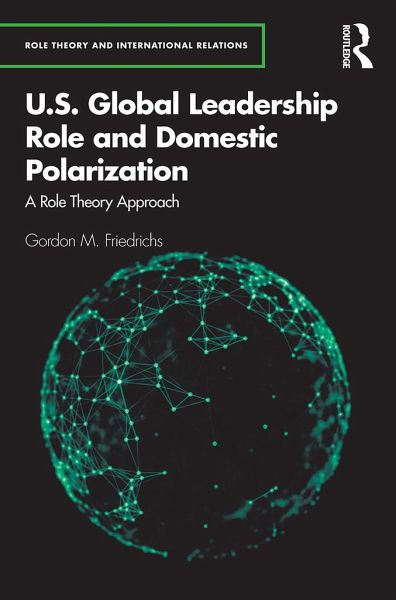
U.S. Global Leadership Role and Domestic Polarization
A Role Theory Approach
Versandkostenfrei!
Versandfertig in 6-10 Tagen
40,99 €
inkl. MwSt.
Weitere Ausgaben:

PAYBACK Punkte
20 °P sammeln!
In this book Gordon Friedrichs offers a pioneering insight into the implications of domestic polarization for U.S. foreign policymaking and the exercise of America's international leadership role.Through a mixed-method design and a rich dataset consisting of polarization data, congressional debates and letters, as well as co-sponsorship coalitions, Friedrichs applies role theory to analyze three polarization effects for U.S. leadership role-taking: a sorting effect, a partisan warfare, and an institutional corrosion effect. These effects are deployed in two comparative case studies: The Iran n...
In this book Gordon Friedrichs offers a pioneering insight into the implications of domestic polarization for U.S. foreign policymaking and the exercise of America's international leadership role.
Through a mixed-method design and a rich dataset consisting of polarization data, congressional debates and letters, as well as co-sponsorship coalitions, Friedrichs applies role theory to analyze three polarization effects for U.S. leadership role-taking: a sorting effect, a partisan warfare, and an institutional corrosion effect. These effects are deployed in two comparative case studies: The Iran nuclear crisis as well as the negotiations of the Trans-Pacific Partnership Agreement. Friedrichs effectively exposes the drivers of polarization and how this extreme divergence has translated into partisan warfare as well as institutional corrosion, affecting direction and performance of the U.S. global leadership role.
Through advancing role theory beyond other studies and developing the concept of "diagonal contestation" as a mechanism that allows us to locate polarization within a "two-level role game" between agent and structure, U.S. Global Leadership Role and Domestic Polarization is a rich resource for scholars of international relations, foreign policy analysis, American government and polarization.
Through a mixed-method design and a rich dataset consisting of polarization data, congressional debates and letters, as well as co-sponsorship coalitions, Friedrichs applies role theory to analyze three polarization effects for U.S. leadership role-taking: a sorting effect, a partisan warfare, and an institutional corrosion effect. These effects are deployed in two comparative case studies: The Iran nuclear crisis as well as the negotiations of the Trans-Pacific Partnership Agreement. Friedrichs effectively exposes the drivers of polarization and how this extreme divergence has translated into partisan warfare as well as institutional corrosion, affecting direction and performance of the U.S. global leadership role.
Through advancing role theory beyond other studies and developing the concept of "diagonal contestation" as a mechanism that allows us to locate polarization within a "two-level role game" between agent and structure, U.S. Global Leadership Role and Domestic Polarization is a rich resource for scholars of international relations, foreign policy analysis, American government and polarization.














